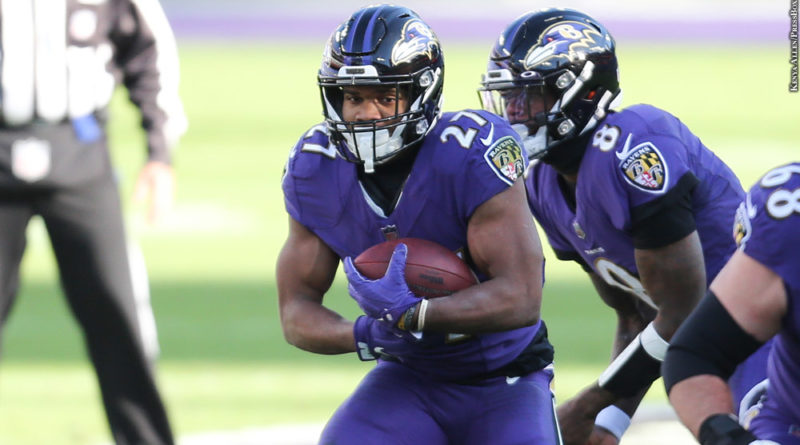En route to rolling to a 14-2 record and the most prolific rushing season in NFL history last season, the Ravens faced one team that made the yardage harder to come by than any other: The Buffalo Bills.
One year later, the Ravens return to Buffalo for an AFC divisional-round playoff game, and their ground game again figures to be the anchor of their offense. They surely will be hoping for more success than last year, when the Bills held the Ravens to 118 yards rushing — their lowest total of the season — and 3.6 yards a carry, their second-lowest.
The Ravens held on to win that game, 24-17, when Marcus Peters broke up a Bills’ fourth-down pass at the goal line with about one minute left.
The Ravens — winners of six in a row including a 20-13 wild-card-round win against the Tennessee Titans — visit the No. 2 seed Bills — winners of seven in a row — Saturday, Jan. 17, at 8:15 p.m.
Predictably, much of the pregame focus is on reigning league Most Valuable Player Lamar Jackson and Bills quarterback Josh Allen, who is in the short conversation for league MVP honors this year after leading the Bills to a 13-3 regular-season record.
For the Ravens, Job No. 1 will be running the ball more effectively than they did last year against the Bills, who jammed the line of scrimmage to try to stop the run. Windy conditions made throwing problematic at times, and the Bills frequently put eight defenders near the line of scrimmage.
The plan worked to a large degree. Jackson ran 11 times but was limited to 40 yards — his second-lowest total of the season. Mark Ingram led the Ravens with 50 yards rushing, but he needed 15 carries to get there.
In one of the game’s highlight plays, Jackson juked Bills linebacker Matt Milano practically out of his shoes as Milano crashed hard inside on a Jackson fake, and Jackson darted past Milano to the outside for a gain of 7.
But the big runs were nowhere to be found. No Ravens running back had a carry of more than 9 yards. Jackson had the team’s longest run, 16 yards, on his first carry. After that, he totaled 24 yards on 10 runs.
The Bills entered that game with the league’s No. 3 defense, but this year, it has been the play of Allen and a passing attack led receiver Stefon Diggs (NFL-best 1,535 yards) that have been at the heart of their success.
The Bills defense has slipped to No. 14 overall, and they rank 17th against the run, allowing 119.6 rushing yards a game. Opponents are averaging 4.62 yards a carry, the seventh-most in the league.
In two of their three losses — to the Kansas City Chiefs and Arizona Cardinals — the Bills allowed more than 200 rushing yards. The Ravens, meanwhile, are back to chewing up yardage on the ground at a prolific pace. During their six-game winning streak that includes their win in the opening round of the playoffs, the Ravens have averaged 262 rushing yards a game.
Offensive coordinator Greg Roman said an offensive “evolution” helped the running game surge during the second half of the season. The dynamic ability of rookie J.K. Dobbins to stretch the field horizontally, and the increasing use of two-back sets with both Dobbins and Gus Edwards on the field together, has paid dividends.
And, Roman said, teams that try to overcommit to stopping the run the risk of leaving themselves exposed downfield.
It’s then up to the Ravens to make them pay, and that’s what Jackson did against the Bills last year.
On a first-and-10 with nine Bills stacking the box, Jackson faked a handoff to Edwards that froze inside linebacker Tremaine Edmunds and safety Jordan Poyer, who had crept up toward the line of scrimmage. Jackson then lofted a pass to a wide-open Hayden Hurst, who had run past Poyer, and Hurst outraced everyone for a 61-yard touchdown, one of three touchdown passes for Jackson in the win.
“That’s kind of the trick of this whole thing,” Roman said last week. “It’s not all about the running game. It’s about the combination of the run and the pass game.”
Photo Credit: Kenya Allen/PressBox

